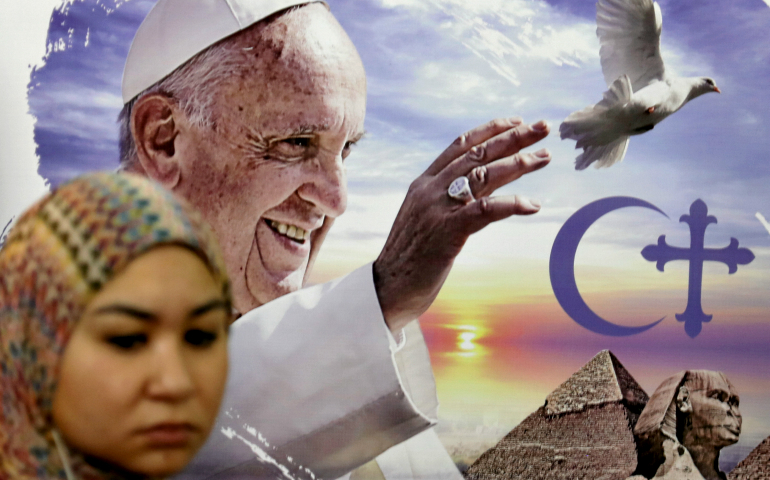
An Egyptian woman stands in front of a poster of Pope Francis April 6 in Cairo. (CNS/Reuters/Mohamed Abd El Ghany)
At the end of this month, Pope Francis will visit Coptic Orthodox Pope Tawadros II, whose community suffered two vicious bombings on Palm Sunday. Francis will also be visiting Egyptian officials, the Catholic community, and Muslim leaders during his short visit. He arrives at 2 p.m. (Egyptian time) on April 28 and leaves 29 hours later.
The Coptic Orthodox Church has existed in Egypt for centuries and comprises about 10 percent of the population. Its head is referred to as "pope," which is derived from Latin and Greek words for "father," a title used for bishops and even priests prior to the fourth century. The Copts have experienced hostility and persecution as well as periods of calm and peace with their neighbors.
Recently, with the rise of Islamic radicalism, the Coptic community has experienced its own via crucis. Churches have been attacked and burned by mobs; individuals, families and communities have been targeted; and Copts have been beaten and killed. Things have been especially bad in rural areas, where security personnel can look the other way.
The Coptic community felt especially besieged during the presidency of Mohamed Morsi, who was elected in 2012 after the "Arab Spring." In 2013, extremists destroyed scores of churches in Upper Egypt and the North Sinai.
As a result, the Copts, along with many Egyptians, were strong supporters of the military coup that put Abdel Fattah el-Sisi into power. Tawadros was very public in his support of Sisi. Copts saw Sisi as the strongman who would keep extremists in line and restore stability.
Sisi restored order with a vengeance, throwing more than 30,000-40,000 people in jail. This appears to have been counterproductive. Support for the Muslim Brotherhood has grown to 40 percent today from 26 percent before the coup. The Sisi regime has also been roundly condemned by all human rights groups. As a result, some have questioned Tawadros' embrace of Sisi as well as Francis' willingness to visit Egypt.
Surprisingly, although the human rights situation in Egypt has deteriorated badly under Sisi, religious freedom conditions have improved. (Although I am the chair of the U.S. Commission on International Religious Freedom, the views expressed here do not necessarily reflect the views of the commission. For the commission's views on Egypt, click here.)
Sisi has gone out of his way to condemn sectarian attacks, and there are now fewer prosecutions for blasphemy than in the past. He has shown his gratitude for the Copts' support by attending the pope's Christmas Mass three years in a row. He has restored or rebuilt more than 50 churches destroyed in sectarian violence in 2013. The Egyptian government has even arrested, prosecuted and punished perpetrators of attacks against Christians.
The Islamic extremists have responded by increasing their attacks on Coptic Christians. This feeds their false narrative of a war between Muslims and Christians. It also provides an easy target that will embarrass Sisi by showing him powerless to protect the Christians as he promised. The attackers also hope to get media attention in Europe and America where it damages Egypt's reputation and undermines its tourism industry.
These attacks have resulted in thousands of Copts being chased out of Sinai by the Egyptian version of the so-called Islamic State. On Palm Sunday, a bomb exploded inside a Coptic church in Tanta, 50 miles north of Cairo, killing at least 44 worshipers. Later, in Alexandria, another suicide bomber detonated his bomb outside the cathedral where Tawadros was celebrating the Palm Sunday liturgy.
The bombings were condemned by Sisi and by Sheik Ahmed el-Tayeb, grand imam of Al-Azhar University, who called them a "despicable terrorist bombing that targeted the lives of innocents."
These two bombings show the uneven security situation for Copts in Egypt. In Alexandria, security precautions caught the suicide bomber outside the church where he was forced to go through a metal detector. The security personnel were killed along with Copts waiting in line to get into church. It could have been much worse except for the diligent guard who stopped the man from getting in the church.
But in Tanta, security precautions appear to have been lax, even though a bomb was found and disarmed near the church earlier this month. As a result, the suicide bomber got into the church and detonated his vest, killing many people. Sisi removed the general in charge of security in the area.
If I were in charge of Francis' security, I would be very nervous about his going to Egypt. But the pope wants to show his support for the Catholic and Coptic communities there. He will have the tricky task of acknowledging the increased religious freedom in Egypt while not ignoring the horrendous violations of human rights.
Still, Egypt is an important place in Francis' ecumenical and interreligious agenda. Visiting the Coptic pope will show his support for this besieged Christian community. Visiting with grand imam of Al-Azhar will be another step in his journey of reconciliation between Christians and Muslims.
Pray he is successful.
[Jesuit Fr. Thomas Reese is a senior analyst for NCR and author of Inside the Vatican: The Politics and Organization of the Catholic Church. His email address is treesesj@ncronline.org.]
Editor's note: We can send you an email alert every time Thomas Reese's column, Faith and Justice, is posted. Go to this page and follow directions: Email alert sign-up.




